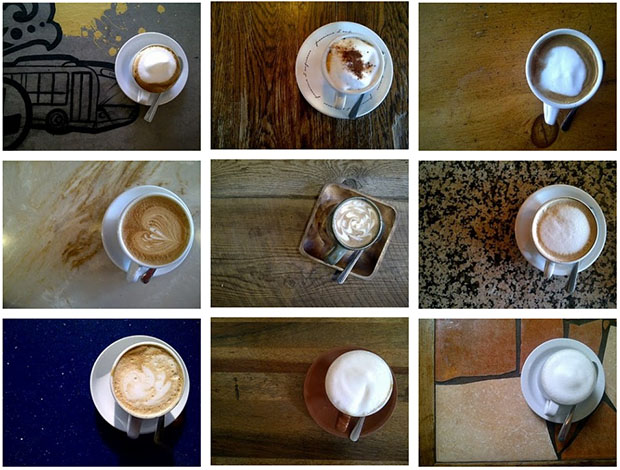What is the price of Starbucks in China? The pricing of coffee
[Starbucks: high price because guests stay for hours] Calver, president of Starbucks China and Asia Pacific, explained that Starbucks China Cafe is much larger than the United States, because most Chinese customers like to stay in the store for a few hours, while 80% of American customers leave as soon as they get the coffee.
Imagine that if you walk into Starbucks one day and find that a large latte costs $27, you must think that all the coffee suppliers on earth have disappeared in an instant; or you may think you may have traveled to the future for decades in a time machine.
This high price well explains the relative cost (in terms of per capita income) that Chinese people spend on a drink. China's per capita income is about $7200, less than 1/5 of that of the United States. At Starbucks in Beijing, however, large lattes have sold for $4.80 a cup-or $1 more than in the United States. A simple espresso with foamy milk is really expensive in China.
Given the high relative price, it is a small miracle that Starbucks can still operate in China. But in fact, the coffee empire from Seattle is thriving in China. In December, Bloomberg reported that Starbucks plans to double the number of employees in China by 2015 and open hundreds of new stores in major Chinese cities. Starbucks even wants to develop China into its second largest market after the United States. In fact, per capita income is just a crude way to measure the purchasing power of Starbucks' real customer base: most Starbucks coffee shops are in China's large coastal cities, where people earn much more than inland per capita. However, in a developing country, especially one where there is no coffee culture, it is surprising that people are willing to pay for the expensive Starbucks. According to normal logic, wouldn't it be better if Starbucks could lower its price a little to attract more customers?
In fact, the problem with lowering prices to attract customers is obvious-it is too expensive to open Starbucks coffee shops in China. In a country where labor is so cheap in China, Starbucks employees earn much less than their American counterparts. This may be paradoxical, but the cost of a large latte goes far beyond the labor costs of employees. The message from the Wall Street Journal is shown in the picture, so feel it:

The really expensive place is logistics and distribution. Imported coffee beans or other materials, such as mugs and coffee cups, are used at a Starbucks in Beijing, almost the same as in the United States. But the real difficulty is domestic logistics and distribution. "although the cost of shipping raw materials from Colombia to Tianjin Port is almost the same as importing raw materials from Colombia to California," said David Wolf, a professor of public relations in Chinese business, "the cost of shipping these materials from Tianjin Port to Beijing is high." Although the government has invested billions of dollars over the past few years to improve the country's port and transport infrastructure, spending on taxes, services and logistics personnel has eventually been passed on to the prices of lattes and cappuccinos, paid for by consumers.
The question is, since Starbucks is so expensive in China, why do so many people buy it? In many cities in China, there are many coffee shops that offer basically the same quality coffee and comfortable environment as Starbucks, but charge much less than Starbucks. But why is Starbucks still so popular?
It is mainly a matter of concept. Since China began to import foreign products in the 1970 s, these products have won the favor of brand-conscious consumers. "generally speaking, foreign goods are always considered to be of better quality, better workmanship and better quality, but in short, they are better than domestic ones." "A person's social status is defined by what he has," Wang Fei, a Washington consultant who grew up in Wuhan, told reporters. " Therefore, high-priced products are highly attractive to those who want to show off their wealth. In other words, buying coffee in a high-end place is a very honorable thing. Another reason Starbucks is so popular may be that its foray into the Chinese market coincided with the popularity of coffee drinking among young Chinese.
But there are also signs that China's preference for high-priced imports is waning. With the development of e-commerce and more and more frequent outbound travel, Chinese consumers are beginning to realize that they seem to spend too much money on the feeling of a cup of coffee. " After living in the United States for some time, when I returned home, I was shocked by the high price of Starbucks in China, "Wang Fei said. This trend is also beginning to emerge in other industries. A disgruntled consumer told the Wall Street Journal's Laurie that shopping in China is not cost-effective!
Will Starbucks' appeal in China fade like the boom in the coffee market? Maybe not anytime soon. Starbucks's localization strategy in China is very good, such as matcha-flavored coffee drinks and collectible mugs designed for different cities. Starbucks's flexible management has also successfully avoided competition from other foreign companies coveting the Chinese market. But for consumers, maybe in the end, they will think that a latte is just a latte, and find that the coffee sold in those obscure shops on the street is actually very good!
[Starbucks: high price because guests stay for hours] in response to accusations of profiteering in Chinese state media, Calver, president of Starbucks China and Asia Pacific, responded that the profit margins of Chinese coffee shops are not higher than those of the United States. Starbucks China Cafe is much larger than the United States, he explained, because most Chinese customers like to stay in the store for hours, while 80% of American customers leave as soon as they get the coffee.
Important Notice :
前街咖啡 FrontStreet Coffee has moved to new addredd:
FrontStreet Coffee Address: 315,Donghua East Road,GuangZhou
Tel:020 38364473
- Prev

Although coffee has a refreshing effect, you can't drink too much.
Drink the right amount of coffee, coffee plays an exciting role, if the spirit is in a state of excitement for a long time, it will change the function of the body, that is, when this excitement has become a habit, you will find that you need coffee every day to maintain your spirit. Now coffee is no stranger to everyone, mainly because there are more and more coffee trees, so the price of coffee has also been reduced.
- Next

Our lives are made more exciting by coffee.
Coffee drinkers can always feel different things from it, and coffee also brings us a lot of benefits. For some office workers who need to use their brains all the year round or face the computer all day, they are prone to fatigue and it is difficult to concentrate on their work. Therefore, many people will choose to drink a refreshing cup of coffee at breakfast or at work, bitter coffee with a faint flavor
Related
- Beginners will see the "Coffee pull flower" guide!
- What is the difference between ice blog purified milk and ordinary milk coffee?
- Why is the Philippines the largest producer of crops in Liberia?
- For coffee extraction, should the fine powder be retained?
- How does extracted espresso fill pressed powder? How much strength does it take to press the powder?
- How to make jasmine cold extract coffee? Is the jasmine + latte good?
- Will this little toy really make the coffee taste better? How does Lily Drip affect coffee extraction?
- Will the action of slapping the filter cup also affect coffee extraction?
- What's the difference between powder-to-water ratio and powder-to-liquid ratio?
- What is the Ethiopian local species? What does it have to do with Heirloom native species?

